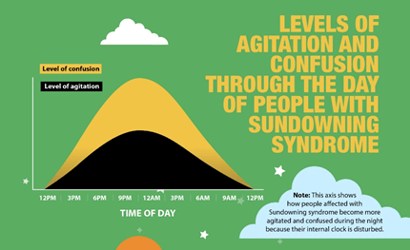
Fall brings colder weather and shorter days. Before we know it Thanksgiving will be here and we will be preparing for the busiest time of the year. These changes may be exciting to some, but for others, fall can be a difficult time. For individuals suffering from Alzheimer's or dementia, a change in the environment can be confusing, and frustrating.
The Alzheimer’s Association (AA) has reported approximately 5.8 million Americans are currently living with Alzheimer's disease. By 2050, this number could increase to nearly 14 million individuals. With these high numbers, it is important to stay informed about the best ways to care for individuals and loved ones who are living with this disease.
As we get older it isn't unusual for our hobbies, interests, and habits to change. After all, if we continued to like and do the same thing our whole lives it would become less interesting. These types of changes in our behavior can be fun, and connect us with others. When it comes to the behavioral changes associated with Sundowners Syndrome, we can find our loved ones isolating themselves and becoming more irritable than usual.

What many people don't realize is that Sundowning can become even more prevalent in the fall and winter months due to the shortened days and typical gloomy weather. If your loved one currently has mid-stage to advanced Alzheimer's disease or dementia, they may exper
ience Sundowners Syndrome and Sundowning. Sundowning tends to occur in the late afternoon, and this is when individuals tend to become the most uncomfortable and irritable.
Possible Causes of Sundowning:
- Being overly tired
- Unmet needs such as hunger or thirst
- Dim or low light, which can cause shadows that may lead to hallucinations
- Depression
- Boredom
- Pain
Watching a loved one become uncomfortable and change before your eyes can be difficult, and disheartening. It is important to remember that there are many different resources and groups that can help both you and your loved one get through this transitional period. Here are some helpful tips for adjusting to the behavioral changes that comes along with Sundowners Syndrome.
7 Tips to Help Reduce and Cope with Sundowners Syndrome:
- Reduce noise, clutter, or the number of people that are around your loved one, especially in the evenings
- Try to occupy them by inviting them to take part in a game of cards, fold towels or even help with easy and safe tasks for dinner.
- Avoid low lighting. Close curtains or blinds to reduce shadows which may cause confusion.
- Do some light and easy exercises with your loved one.
- Make sure they get enough rest at night, by keeping naps light during the day.
- Play soft music in the evenings to provide a calming atmosphere.
- Try various essential oils, such as peppermint or lavender in a room diffuser to promote relaxation.

Just like the seasons change throughout the year so will your loved one's behavior. Remember to stay patient, caring, and loving during this difficult and confusing time. By doing this, and asking for help if needed, behavioral side effects of Alzheimer's such as Sundowning will become easier to manage.
Wondering how the team at Gulfside can help you as a caregiver? Click here to learn more about our services.








